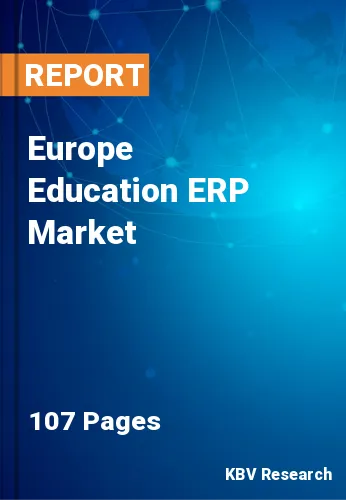The Europe Education ERP Market would witness Market growth of 14.0% CAGR during the forecast period (2022-2028).
Academic institutions such as insurance enterprises have a slew of administrative costs associated with normal procedures. Recruitment, class enrollments, placing administration, payroll, and a variety of other operations are included. This not only raises unnecessary expenditures for private colleges, but also places numerous responsibilities on teachers and diverts time that could be better spent on students and research.
The ultimate goal for every institution is to strengthen the credibility and trustworthiness of its business through excellent student results. In this digital generation, rather than looking for answers in books, pupils of this century turn to Google. They prefer to have all of their information on their smartphones. Students can use a student app to access all of their vital information from their phones, including student records, certificates, mark sheets, and attendance statistics.
The education system in the European region is evolving with the deployment of the new ERP systems. The early childhood educators supporting children's cognitive, social, and emotional growth to universities educating individuals for active engagement in further education, research, and job. Since most firms and institutions have adopted remote working and online education, the attention on cloud network types, network security, and contingency planning has increased in Europe in recent months. Due to the majority of the population working from home, internet traffic in the area has surged by up to 50%.
Academic institutions cut back on the introduction of unique services and infrastructure during the pandemic. All administrative and academic operations are done virtually due to the nationwide lockdowns. This, in turn, is causing the education ERP Market in the region to expand. Simultaneously, the fledgling EdTech sector is outperforming its peers internationally and has a continually expanding export Market . Although technology is frequently associated with more automation and diminished human interaction, it will never fully replace the function of outstanding educators in the educational sector. Technology can be an effective tool to help reduce workload, increase efficiencies, engage students and communities, and provide tools to support excellent teaching and raise student attainment.
The Germany Market dominated the Europe Education ERP Market by Country in 2021, and would continue to be a dominant Market till 2028; thereby, achieving a Market value of $2,176 million by 2028. The UK Market is experiencing a CAGR of 13% during (2022 - 2028). Additionally, The France Market would showcase a CAGR of 14.8% during (2022 - 2028).
Based on Component, the Market is segmented into Software and Services. Based on Application, the Market is segmented into Student Management, Academic Management, Human Resource Management, Finance & Accounting Management, and Stores, Procurement Management & Others. Based on Deployment Model, the Market is segmented into On-premise and Cloud. Based on End User, the Market is segmented into Higher Education and K-12. Based on countries, the Market is segmented into Germany, UK, France, Russia, Spain, Italy, and Rest of Europe.
Free Valuable Insights: The Global Education ERP Market Size will Hit $32.3 Billion by 2028, at a CAGR of 14.2%
The Market research report covers the analysis of key stake holders of the Market . Key companies profiled in the report include Microsoft Corporation, Oracle Corporation, SAP SE, Workday, Inc., Infor, Inc. (Koch Industries), Brainvire Infotech, Inc., Serosoft Solutions Pvt Ltd. (The Hindustan Group), Unit4 N.V. (Advent International), Ellucian Company L.P., and Jenzabar Inc.
By Component
By Application
By Deployment Model
By End User
By Country
Our team of dedicated experts can provide you with attractive expansion opportunities for your business.

